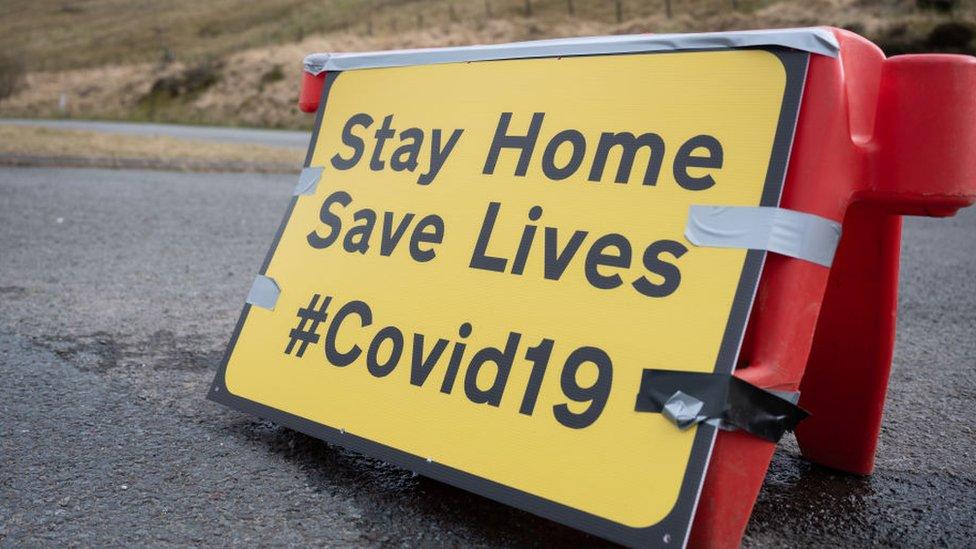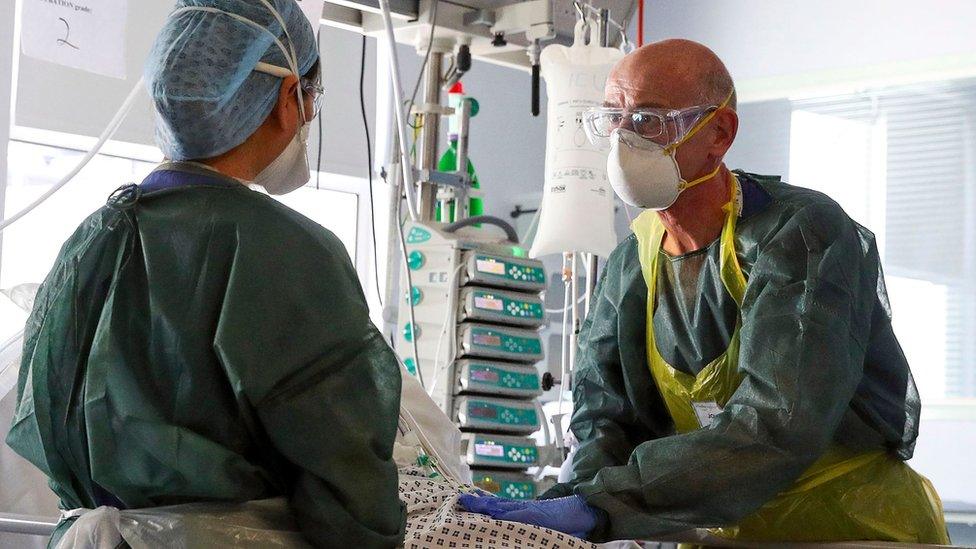Covid: Early failures were stark - lessons must be learnt
- Published

The handling of the pandemic by the UK in the early months was, according to a cross-party group of MPs, one of the worst-ever public health failures.
Many of the headline findings will be familiar - the criticism of the delay to the first lockdown and the chaotic start to life for NHS Test and Trace.
But the details presented in the 150-page report also set out some of the underlying reasons for what went wrong and how the UK could be better prepared for the next pandemic.
Too focused on flu
Before Covid hit, the UK was widely lauded as being one of the best prepared. We might have been - if it had been a flu pandemic.
Flu is not characterised by silent spread - people who do not have symptoms passing it on. This means testing is not so important in containing it. The onus can be much more on getting people who are ill to isolate to combat its spread.
Countries in East and South Asia, which had had experience of dealing with other major coronavirus outbreaks, Mers and Sars, were therefore much better prepared.
Over the past 20 years they had invested in their public health system so they could quickly increase testing capacity and had data sharing agreements between national and local agencies to enable fast and effective contact tracing.
For example, South Korea was detecting cases and responding to outbreaks by late January, while the UK was still talking about managing the spread of the virus.
South Korea has still had to deal with outbreaks and introduce restrictions, but the fact it did not get such a strong foothold to start with has helped keep infections down. The total number confirmed since the pandemic started is 20 times lower per head of population than in the UK.
The UK had nothing like this in place - local public health budgets have been cut in recent years. So despite the UK being one of the first countries to develop a test for Covid in January, it was not able to capitalise on that advantage. By 12 March the UK announced it was abandoning the idea of testing in the community.
We lost sight of the virus at key point
It would be May 2020 before test and trace systems were up-and-running in the UK, but even then the system in England was centrally-run with virtually no involvement for local council public health teams. It was, the report said, a "slow, uncertain and chaotic" service to start with.
A major factor in the decision to stop testing was a lack of capacity to process tests. Public Health England's network of labs was only able to process 500 a day at that stage.
Capacity started to increase and by mid March a total of 27,000 tests had been done in the UK. But that pales in comparison to Germany, with its much bigger diagnostics industry, that enabled 50,000 tests a day to be done at that stage.


That has now, of course, been rectified. More than 800,000 tests a day can be performed, giving the UK one of the biggest diagnostic testing networks in the world.
But it came too late. Ending testing in the community in those early days meant we lost sight of where the virus was and how it was spreading at a crucial time.
This had catastrophic consequences for care home residents in particular with thousands of vulnerable hospital patients discharged into them without being tested and staff free to come-and-go in those early weeks not knowing if they were spreading the virus asymptomatically.
Germany, with its superior testing capacity, did much better at protecting its older population. That saved lives - in the first wave the number of deaths per head of population was five times lower in Germany than in the UK.
The trap of group-think
The UK was not alone in being under-prepared. The same argument could be made for much of the rest of Europe outside of Germany.
But even within Europe we had one of the worst first waves.
Why? The MPs' report talked about the problem of group-think. Among ministers and the scientists advising them on SAGE there was no-one willing to challenge the perceived wisdom.
So while other nations in Europe - Italy and then France and Spain - were announcing lockdowns and travel restrictions with evidence emerging the virus was spreading with deadly consequences, the UK rejected the precautionary approach and was still talking about managing it rather than stopping it.
Major sporting events were still being held in mid-March, including the Champions' League football match between Liverpool and Atletico Madrid and the Cheltenham Racing Festival.

More than 52,000 fans watched as Liverpool lost 3-2 to Atletico Madrid at Anfield on 11 March 2020
Subsequent research has found that during February and March the virus was brought into the UK on at least 1,300 separate occasions - the majority from France and Spain which were not subject to any travel restrictions or checks.
It was not until 23 March 2020 that a lockdown was announced - a full two weeks after Italy. Every week's delay was estimated to be doubling the size of the peak at that stage.
The whole approach - in the words of England's former chief medical officer Prof Dame Sally Davies - smacked of "British exceptionalism", an over-confidence in our beliefs and knowledge.
With a full public inquiry starting next year, this report is being seen as the first step in making sure the UK is better prepared for when the next pandemic hits.
Follow Nick on Twitter, external
- Published15 September 2021

- Published11 November 2020

- Published5 July 2023

- Published5 July 2022

- Published30 April 2020

